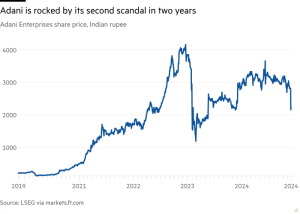The problem with the term ‘global majority’
Unlock the Editor’s Digest for free
Roula Khalaf, Editor of the FT, selects her favourite stories in this weekly newsletter.
Race may not be real — but both racism and ethnicity are. That’s the essential challenge for policymakers, organisations and campaigners. As a man of mixed ethnicities, I really am more likely to have higher cholesterol and be at greater risk of type 2 diabetes, even before any choices I might make about diet and exercise, thanks to a series of inheritances from my Indonesian grandfather. That’s “ethnicity”. But when I experience racism, it is either because I “look” Black or because someone has found out that I am Jewish.
So any label or grouping you choose to measure ethnic differences will be imperfect, or at the least, will work better in some settings than others. When we assess the quality of the healthcare someone receives, we need to know about their ethnicity and any complications that might pose for their treatment, but we also need to know what medical staff may believe about their race.
Sometimes greater granularity is useful. Important patterns can be obscured, problems ignored or invented, by lumping in quite different groups under a single label. But at other times, it can create a false sense of precision and lead to making some quite big extrapolations off the back of limited or historic data. In those occasions, talk of an umbrella term, be it “ethnic minority” or something else, can be useful.
Understandably, though, most people tend to chafe at such catch-all terms, and so organisations are continually looking for new ones in a bid to solve the problem. Now a phrase from the mid-2000s is increasingly coming into vogue: the “global majority”.
The label was coined by an academic, Rosemary Campbell-Stephens, as part of her work on increasing the number of Black and Asian people in leadership roles in education. She sought to “reframe” ideas about what it means to be an ethnic minority by drawing attention to the fact that Black, Asian, mixed and other ethnic groups are actually a majority of the world’s population.
As a mantra for self-empowerment among senior leaders you can see the appeal. Being reminded of your own history and its successes is a highly effective way to feel good about yourself. But as a way of thinking about or classifying ethnic minorities more broadly, it is a very poor fit indeed.
By design it excludes people from ethnic minority groups that are largely “white”: in the United Kingdom, for instance, that excludes, most importantly, those from a Gypsy, Roma or Traveller (GRT) background. I say “most importantly” because we have excellent data available on ethnic disparities in the UK, and the group that does worst in terms of mortality, access to employment and banking facilities, and essentially any other metric you care to name, are people of GRT heritage.
This is not to say that every problem experienced by GRT people in the UK is the responsibility of either businesses or the state, or that it can necessarily be fixed by them. But organisations should, when choosing these labels, make sure that they are not using language that excludes those who are most likely to need help. To return to the origins of the term “global majority”, it is not a good thing for the leadership of a school, say, to use a term that deliberately places the ethnic group most likely to leave without getting good GCSEs outside of its walls.
Where Campbell-Stephens was exactly right is that the label you apply to a group does change how you feel and think about that group, whether you are part of it or not. That is a good reason to use the term “ethnic minority”, which polling consistently shows is the preferred umbrella term of most people in it. But it’s not only the self-esteem of the people using it that is changed. So too is how they think about issues of race and diversity.
Because the biggest problem with the idea of a “global majority” is that the central claim that it makes is not really true. Being part of a minority is not something you are, it is something that is done to you. At different times, at different places in the world, people are declared outside the majority group, whether in the playground, in law or in the workplace for reasons they don’t control. Ultimately, we are all minorities, or can become so at any time: it is why the best and most effective laws to help minorities are the ones that ensure broad rights for everyone.
The joys and challenges of being a dark-skinned man in Britain are not fixed or illuminated by the idea that I am part of a global group that includes a Chinese schoolteacher in Shanghai or an Indian bureaucrat in New Delhi. They are best understood by the fact that I am part of a global majority called the human race.
#problem #term #global #majority







